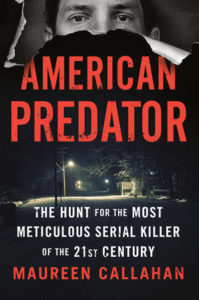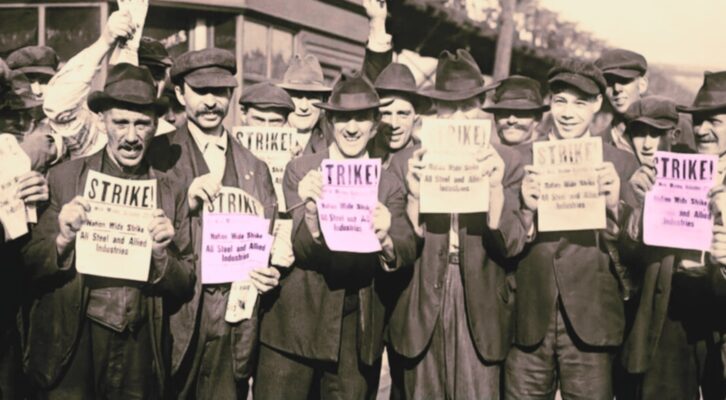Most people have never heard of Israel Keyes, one of the most ambitious and terrifying serial killers in modern American history. The FBI and Alaska law enforcement first encountered him in April 2012, when he was arrested for using an ATM card belonging to Samantha Koenig, an Anchorage girl who’d gone missing two months earlier. They otherwise had zero evidence connecting Keyes to Samantha, yet two things were critical: They somehow needed to elicit a confession, and they needed Keyes to admit—as they were quickly beginning to suspect—that he had done this before.
As they would soon learn, Keyes had invented an unprecedented modus operandi, flying into major cities, renting a car, digging up “kill kits” he had buried all over the country, finding a victim, kidnapping, raping and killing, often leaving the body in yet another state before putting thousands of miles between himself and the crime scene. He used only cash and ripped the battery out of his cell phone on these travels, and never left DNA behind.
The FBI’s top criminal profilers admitted they had never seen a killer like Keyes before. He left even these hardened men and women terrified.
But getting to that point would depend on this early and very delicate exchange. What happens in this room is a master class in criminal interrogation—led by Monique Doll, the most glamorous detective in Anchorage — who was simultaneously working another challenge: deflecting the attempts of federal prosecutor Kevin Feldis, who had never dealt with criminal investigations, from trampling all over her attempts to build rapport with Keyes and take control of the most high-profile case Alaska had seen in years.
Doll took her cues from a storied dynamic: That between Hannibal Lecter and Clarice Starling in “The Silence of the Lambs.”
Trigger warning: the following excerpt contains graphic descriptions of violence.
____________________________________________
Miki Doll returned to Anchorage on Sunday, April 1. For the second time in three weeks, she found herself face‑to‑face with Israel Keyes.
For Steve Payne, this was an unexpected assist. As much as he and Doll clashed, her presence, something of a command performance, would make this interrogation a win for law enforcement. She might neutralize Feldis and maybe even humble him. More important, she would get those details. Miki Doll knew how to play.
Feldis opened by reading Keyes his rights, but instead of handing the lead off to Doll, he segued right into questioning.
FELDIS: Is there a place you’d like to begin or is there . . .
KEYES: Well, um, you’re gonna get the abridged version.
FELDIS: Okay, what does that mean?
KEYES: I’m gonna leave out some stuff.
FELDIS: And why is that?
KEYES: There’s too many—there’s too many people in here, so.
FELDIS: Okay, so what is that about?
KEYES: There being too many people?
FELDIS: Uh‑huh.
KEYES: Um, some of the stuff is very, uh, personal to me.
FELDIS: Sure, understand.
KEYES: And, um, yeah—hard to describe, but I don’t feel comfortable telling it to a lot of people so it’s up— t’s up to you.
This was a no‑brainer, Payne thought. Leave Keyes with Doll, Curtner, and maybe Bell, if that was okay. Whether this guy was getting off on telling his story to a stunning young detective or whether he really required some form of cosmetic privacy didn’t matter to Payne. They needed those details.
FELDIS: Well, why don’t we do this. Since we don’t know where we’re headed— don’t know where we’re headed, Israel, only you know that, right? So let’s start and see where we end up, okay?
Feldis was not leaving that room without a fight.
Doll took this moment to work her way in. This would not be the kind of hard‑core, sanctimonious interrogation as seen on TV. She would, correctly, play humble. She would apologize for interrupting and show a detached respect. She might hear the worst atrocities one human being can visit upon another and respond only with “Gotcha.” If her subject laughed, she would laugh along, no matter how repulsed she might be.
Doll began by telling Keyes that even though she’d listened to yesterday’s interview over the phone, the connection was poor. Most of the voices sounded “like Charlie Brown’s teacher.” She wasn’t up to speed and needed his help.
DOLL: I’m not really sure if you want me to ask you questions or if you . . .
KEYES: If you have questions, that’s fine.
She had just laid the groundwork for a new dynamic, one that recalled the relationship between Clarice Starling and Hannibal Lecter in The Silence of the Lambs. This was not by accident. The search of Kimberly and Keyes’s house two weeks back had yielded scores of books, fiction and nonfiction, about serial killers. Those days Keyes went missing in Texas were now of even deeper concern, and given what they now knew about Samantha’s abduction, it was clear Keyes had done this before. How many times? If Samantha wasn’t his first victim, was she, in fact, his last? He said he’d been “two different people” for fourteen years and that there was a lot more he had to say. The team was absorbing the likelihood that Keyes could be a serial killer. If so, he would clearly see himself in the pantheon, worthy of an interrogator who had movie‑star quality.
Doll certainly had that.
Her first question was pointedly not about Samantha but about Keyes’s daughter, who had been in Texas with his mother. Payne and his team knew the child was Keyes’s soft spot.
DOLL: When we spoke in Texas—and it might be completely wrong and if I’m completely off base, tell me—but I got the distinct impression that you didn’t want [her] to be raised by your mom.
KEYES: Very perceptive.
DOLL: Is that something you’re concerned about?
KEYES: Not anymore.
DOLL: Okay, sure. I won’t waste any more time about it. Like I said—
“Like I said.” Subtle. Perfect. Doll had clearly listened closely to the confession, because she’d picked up and mirrored one of Keyes’s verbal tics: “Like I say.” She was building rapport.
DOLL: I—I don’t really know where you guys left off and why there were some things you only wanted to talk to me about. Um, so I don’t know what questions to ask.
KEYES: You don’t have to ask—um, like I say, I’ll give you a detailed account of everything that happened. If you want a blow‑by‑blow account, then I won’t do it—you know, like what I was thinking or what was said between her and I—that stuff stays with me unless there’s fewer people in this room.
RUSSO: How many people you—
DOLL: At least your attorney has to stay.
FELDIS: Well now, let’ s—let’s—let’s just start with the abridged version and then we can go from there.
Feldis was gripping the conference table with white fingertips. It was now clear that case agents should have done whatever it took to keep him out of that room from the beginning.
The way Keyes talked to Feldis was markedly different than the way he talked to Doll. She, he wanted to help. He referenced their first meeting in Texas. “You’ve got your monster,” he said. It was almost like he was proud of her.
Feldis, he wanted to dominate. Humiliate.
KEYES: Well, before I go into anything . . . Some of the details, regardless of which version I tell you, are going to be very graphic. And I don’t want to hear about them being on the media . . . I don’t imagine that you are going to want them on the media either. At least I can’t imagine why. So, you know, I’m assuming that this video is just for your review or someone else’s review.
FELDIS: You gotta talk to me about that ’cause I’m the lawyer on the case. So go ahead.
This was exactly why Keyes shouldn’t be talking to Feldis, but Keyes didn’t know that.
The investigators assured Keyes that they would keep all details from the press, including the extent of Samantha’s captivity and the location of her remains. Most important to Keyes, they would do everything they could to keep his daughter’s name and location secret.
So far, reporters knew only that an Anchorage man named Israel Keyes had been arrested in connection with Samantha’s disappearance. A critical irony was not lost on Payne, Bell, and Doll: They, too, didn’t know much more. The analysts at BAU had stressed control, that every‑one in the room should make Keyes feel like he had more than anyone. The truth was, they didn’t have to do anything. Keyes really did have all of it.
He was back in the shed.
KEYES: On the floor there was a tarp and a foam mat and a sleeping—or not a sleeping bag really but like a fleece sleeping bag of sorts.
DOLL: Did you put the tarp down to catch any blood?
KEYES: No. Just to keep anything from her transferring to the shed.
DOLL: Gotcha.
Keyes said he prepped the shed a couple of days earlier. He had no specific plan or person in mind, he said, though he’d been “looking at the Huffman area” because it was also full of coffee stands that were open late, in isolated areas, staffed by teenage girls, almost all of whom were alone.
That night, he’d come upon Samantha. He liked the look of her and he went ahead. “Even, I guess you could say, against my judgment.” He had thought about waiting for whoever was going to pick her up— boyfriend, as he had correctly guessed—and taking both of them, but decided not to risk it.
After breaking into Samantha’s truck, stealing her ATM card, and testing the PIN number at a local machine, he returned home. He went into the kitchen and poured a glass of wine for himself and water for Samantha.
Then he returned to the shed.
Samantha was remarkably composed. She asked if everything was working out.
Did you reach my dad? she asked.
Yeah, Keyes told her. It’s fine.
He knelt down and unscrewed the rope from the wall. He cut her cable ties. He knew what he was doing: Igniting that last spark of hope, letting her think he’d be getting the ransom money while untying her, allowing her to think that surely, this was the end. That, as he had promised all night, he’d be letting her go.
He would not.
Keyes restrained Samantha again, this time in a more complicated way, using ropes rather than cable ties.
“She knew at that point,” Keyes said.
He left the shed again and checked on Kimberly.
“She was awake,” he said.
This was different from what Keyes had said yesterday. In that version, he waited until Kimberly had gone to sleep. What was going on here? Did Keyes really act alone? The timeline he was insisting on—Payne and his team still didn’t buy it.
Again, Keyes returned to the shed. Space heaters had pushed the temperature inside to 90 degrees. Deafening heavy metal shook the walls. The acrid smell of smoke and urine and sweat permeated.
Keyes said he raped Samantha twice. It took, he said, “ awhile . . . maybe two or three songs” on the radio. When he was done, he stood above her, naked. Samantha asked if he was going to kill her. She tried to talk him out of it. Her fortitude was remarkable, Keyes said. Admirable. But it left him unmoved.
KEYES: Then, uh, I put my leather gloves on.
DOLL: Why did you put leather gloves on and not rubber gloves?
KEYES: ’Cause it’s hard work to strangle somebody. . . . I knew— knew from the minute she walked out of that coffee stand she wasn’t—she wasn’t gonna live. . . . She never made a sound.
DOLL: How long did it take her to die?
KEYES: It was taking— mean, it’s always—it’s hard to tell when, um . . . It was taking awhile. I remember thinking, “I still have to shower.” . . . Anyway, I’m not gonna tell all that part but I, um . . .
DOLL: Why?
KEYES: I stabbed her once right below her right shoulder blade in her back . . . and it wasn’t going very deep. I’m not gonna go into that, but anyway she—I didn’t really stab her to make her die faster or anything. It was something else, but, um, I took . . .
DOLL: Did you stab her because you were still attracted to her?
KEYES: No, I’m not gonna go into that. . . . I finished my wine and put my pants on and went back into the house and took a shower.
Then he woke his daughter. While she got ready, Keyes returned to the shed yet again. The space heaters had been left on to slow rigor mortis. He rolled Samantha’s body in a tarp, opened up his lower cabinets, hid her remains, turned off the heaters, double‑locked the shed door, and called a cab.
FELDIS: What was your plan? You were getting on a plane and her body was in your shed. What were you thinking?
KEYES: I was thinking it was twenty degrees outside and I didn’t have anything to worry about.
FELDIS: Were you worried about getting caught?
KEYES: No.
FELDIS: Why not?
KEYES: Partly because it’s Anchorage. . . . I’d been listening to the police scanner a lot recently and just kind of felt like by the time anybody figured out what had actually happened, the trail would already be cold, and even if they had pictures of my truck, they wouldn’t know whose truck it was. They wouldn’t have tire tracks. They wouldn’t have forensic evidence. They wouldn’t have shoe prints. They certainly wouldn’t have fingerprints or DNA or anything so I didn’t worry about it.
This was sobering and, if the investigators were honest with themselves, more than a little embarrassing. Keyes was right. He had predicted their response, or, really, lack thereof. To commit a crime of this magnitude, to drive around with a missing teenage girl for three hours with plenty of witnesses, and not worry about getting caught “because it’s Anchorage”—that was a damning indictment of the police department. It was true. James Koenig knew it. The hundreds of people who showed up for Samantha’s candlelight vigil knew it. If the media ever heard this, all of Alaska would know it. This confession would never be logged with the court or documented anywhere. It would be kept hidden for years.
That morning, aware only that the FBI had a suspect in custody, James had posted another plea on Facebook.
NOW THAT IT’S GETTING WARMER AND THE SNOW’S MELTING PLEASE KEEP YOUR EYES OPEN FOR ANYTHING THAT MIGHT BE OUT OF PLACE, CHECK YOUR SURROUNDINGS YOU JUST NEVER KNOW WHERE THAT ONE LEAD MIGHT COME FROM TO BRING OUR SAMANTHA HOME!!
____________________________________________


















